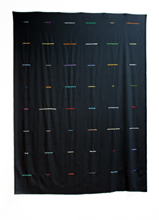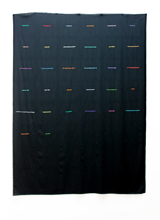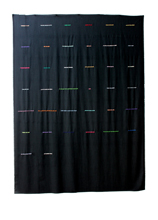SOUL LOVE (MY LOVE AIN'T NO LOVE WITHOUT YOUR LOVE), 2012

Foto © Cornelia König/Kunstverein Baden
SOUL LOVE (MY LOVE AIN'T NO LOVE WITHOUT YOUR LOVE), 2012, Kunstverein Baden
SOUL LOVE (MY LOVE AIN'T NO LOVE WITHOUT YOUR LOVE)
feat. bto spider
Zunächst war SOUL LOVE ein Buchprojekt. Ein Künstler-Buch, das lediglich aus Soul-Sätzen besteht.
Es ist eine Art Partitur dialogischen Sprechens, eine Phänomenologie der Liebe in Form von
Liebes-Sätzen oder Liebes-Titeln. (CH) Ausgangspunkt waren Vinylplatten, Soul-Singles bzw.
deren Titel. Dann kamen sogenannte Sleeves dazu, originale Plattenhüllen, die per Gummi-
stempel händisch mit dem Signet: SOUL LOVE bedruckt wurden. Anlässlich einer Performance
in der Galerie für zeitgenössische Kunst in Leipzig entstand 2010 das Video SOUL LOVE (SINGLES),
dass den DJ bto spider bei seiner Arbeit zeigt.



SOUL LOVE (MY LOVE AIN'T NO LOVE WITHOUT YOUR LOVE), 2012, 3 teilig, Wolle bestickt, je 210 x 160 cm
Als Weiterführung und partizipatorisches Angebot versteht sich die neue Installation SOUL LOVE
(MY LOVE AIN'T NO LOVE WITHOUT YOUR LOVE). Alle Soul-Sätze des Buches werden nebeneinander
an der Wand präsentiert. Das Buch wird in den Raum übertragen. Die Besucher sind eingeladen
diese geschriebenen Sätze im Sprechen zu aktualisieren und sich so anzueignen. Jede/r BesucherIn
kann so seinen/ihren Liebes-Satz akustisch aufnehmen lassen und erhält als Gegengabe die
betreffende Buchseite ausgedruckt und signiert.

Foto © Cornelia König/Kunstverein Baden
SOUL-BÜRO, Tisch, Wolldecke, Eames-Sessel, Aufnahmegerät, Computer, Drucker, Literatur, Beamer, Boxen-set
Es ist ein aktivierendes Tauschgeschäft zwischen Künstlern, Besuchern und Repräsentanten der
Kunstinstitution. Sämtliche Aufnahmen ergeben ein Sprechbuch, der Schrift wird ihre Lautlichkeit,
ihre Musikalität zurückgegeben. Später wird dieses Sprachmaterial auf eine Schallplatte gepresst,
eine neue Single entsteht: SOUL LOVE (MY LOVE AIN'T NO LOVE WITHOUT YOUR LOVE). Im Kunst-
verein Baden wird neben der Installation auch das Video SOUL LOVE (SINGLES) und die Serie
SOUL LOVE (SLEEVES) zu sehen sein.
Am 15. Juni zelebriert Fm4 High Spirits-Priester bto spider einen seiner seltenen Gottesdienste,
natürlich unter dem Motto: SOUL LOVE.
(Mai 2012)
Notes on Love and Songs
Words and fragments that when spoken aloud, and in the right context,
become magic spells, life- and world-changing incantations.
Liebe
I. Antike. Der Begriff L. meint: a) die einheitsstiftenden Beziehungen
zwischen beseelten oder als beseelt gedachten Wesen und ist
daher verwandt mit der Freundschaft; b) die empfundene, auf solche
Vereinigung hinwirkende Kraft und ist daher verwandt mit Begehren,
Verlangen, Erstreben. (From: Historisches Wörterbuch der Philosophie).
Where there is love, there is also soul [and the other way around?].
Different notions of love evoke different contexts and different ways of living:
eros (ecstatic mystery), philia (friends of wisdom), agape (brotherly, sisterly,
universal) somewhere the connection to belief [some distant Indo-Germanic
origin?].
Love as mythical-cosmological force: The sky and the earth meet in love
[Uranus is later castrated by Kronos (the sickle) but (orand?) out of
Uranuss testicles Aphrodite is born (beauty, inwardness: Botticellis Nascita
di Venere)]. Homeric hymns. Frothy sea-born goddess the wind!
The social origins: Social glue. Identity. Distant past still present. The agape
meal: Christian or Pagan in origin? To understand this ancient institution,
should we look to the Seder ritual feast (the foundation of love between
a people escaping the hatred of another) or to the Dionysian mystery cult
(ecstatic love?)? The fact that there is some common sensation that binds
us together. Love binds in friendship, love binds in desire.
The biological-cosmological force: The origin of life, the origin of love? Life
begins in water: eggs, semen or ocean/fresh water. The chain of being
(reproduction of the species, transferring information and warmth throughout
millennia). In this case love = power as underlying force or energy. Love is a
temperature. The chain of heat reaching back millennia with genetic information
protected and passed on. Love binds a species together, shows them
where and how to live together, how to exchange warmth and ultimately to
continue life.
Somehow below the threshold of the perceptible, this information itself
changes [evolution] {Is evolution an example of a life force without love?}
Love and wrath: And the cosmic love of Ancient Semitic gods? The love/
wrath relationship, the dichotomy. Biblical tough love? Old testament-style
Spare the rod, spoil the child. Religious wars, etc. And with Jesus a new
story? [Jesus is Love, Yes Jesus Loves Me, etc.] Reconciliation. Redemption.
Not of this world. The myth of revolution as redemptive (Marxism as the
modern sublation of Christianity). The revolution that never succeeds like the
table set for Elijah, the prophet who never comes but is always there in spirit.
I will always love you Dolly Partons or Whitney Houstons version? [tears,
goose bumps?]
Humanitys love songs repeated over generations by kings, intermittent troubadours
and desolate homeless beggars. The loneliness of the singer. The
lonely death of the singer (the ultimate truth of loves loneliness).
The complexity of language, of the spoken word, of song. What melodies,
what rhythms? Communicating a sense of otherworldliness. What past and
future? Displacing these short declarations of intend that elsewhere could
signify literally EVERYTHING. I love you!
Love is confessed (but it is also expressed as a verdict or edict).
The other day I walked by this guy who was whistling the same song that I
had been singing all day. Joy Division Love Will Tear Us Apart. I wondered if
we had the same taste in music or whether we were going through the same
kind of phase in our lives. The midlife crisis of love?
When routine bites hard and ambitions are low
And resentment rides high but emotions wont grow
And were changing our ways, taking different roads
Die Metaebene der Metaebene
In a letter to Walter Benjamin from February, 1940, Adorno writes, Ich bin
der Überzeugung daß unsere besten Gedanken allemal die sind, die wir
nicht ganz denken können. (Briefwechsel, p.418) It is about introducing
a level of uncertainty, a moment of incompleteness that allows thought to
move beyond itself.
So I started reading Adorno again. Trying to understand what in Adorno
doesnt really make sense or where some of his ideas dont work. The
paradoxical, contradictory, impossible side of Adorno that couldnt be fit
into any neat categories (not so much his infamous elitism or his famous
mottos es gibt kein richtiges Leben im falschen, nach Auschwitz ein
Gedicht zu schreiben ist barbarisch, etc.) Part of the point of Adorno is
precisely this: to maintain a certain level of contradictoriness and lack of
clear-cut statement. Thought must be kept in motion. It should not stay put
in one particular category.
Dialectic: The love of popular songs, of pop. I did a cover of a Sugababes
song Overload. Somehow the Sugababes and Adorno made sense together.
Then Kafkas letters to Milena Jesenskà¡. A mixture based on the books I
was reading that day. I planned to find an underlying connection (soul music,
the emotion love, Adorno, Kafka). There is an underlying connection
to everything! But I wanted to make this connection clear and to give form
to this constellation of vastly different paths.
Entering the realm of the world: the becoming historical of art. Losing the
innocence of poems, drawings and sculptures that do not yet exist in the
historical-administrative context that still silently adorning personal notebooks,
hanging in apartments, etc.
Whoever speaks of culture speaks of administration as well, whether this
is his intention or not. To become culture means also to become Verwaltung.
The fate of art in an administrated world. Adorno, in the same speech,
understands the difficulty of the problem. We are living in a verwaltete Welt.
To renounce administration would merely be a step towards disempowerment.
Je mehr für die Kultur geschieht, desto schlechter für sie, formulierte
Eduard Steuermann [pianist and composer, friend of Adorno]. Diese
Paradoxie wäre zu entfalten: daß sie Schaden nehme, wenn sie geplant
und verwaltet wird; daß aber, wenn sie sich selbst überlassen bleibt, alles
Kulturelle nicht nur die Möglichkeit der Wirkung, sondern die Existenz zu
verlieren droht. (Adorno, Kultur und Verwaltung. Gesammelte Schriften
8, S. 123)
But this condition is not only true for art. Outside of the Verwaltung, there
appears no longer to be the possibility to live and create outside of given
structures.
Es gibt keine Schlupfwinkel mehr, auch in Europa nicht; keine Armut in
Würde, nicht einmal mehr die Möglichkeit des bescheidenen Überwinterns
für den, der aus der verwalteten Welt herausfällt. (Adorno, Kultur
und Verwaltung. Gesammelte Schriften 8, p. 134)
What (or whose) language are we to speak in the administered world? What
songs to sing? What dances to dance? By the Rivers of Babylon Singing
Psalms of freedom (but also the militant, combative voice, the struggle)
At what level can we say: language = administration? {Is there really no
outside?} Things need hermeneutic contexts to make sense: The space
of this context is the world as a philosophical concept. We are in the
world means that we are in a complex of language, power relations and
material conditions. There is no outside of the world. Which in hermeneutics
becomes the il ny a pas de hors-texte. However being-in-the-world is
not only being in text [pretend youve never heard of Heidegger or Derrida
before]. The basic rules (the texts?) of the world are administrative. I dont
know what this has to do with it. Just about making the link to language.
Directly linking language and the world. Being outside of language, being
outside (rambling).
Love, resistance, uprising
It is/was in the Atlantic diaspora where a new language, a new rhythm and
way of practicing music came into being (both African and European), where
the Black slaves and the various European forced laborers, who lived with
a social status ranging from outright slavery to indentured servitude and
then to the working class created an oral and musical culture that remains
the dominant form of musical expression throughout the world [slave music,
folk music, the voice of the oppressed].
It was precisely this different kind of Volk that accentuates the paradox of
modernity. Essentialist, religious, anti-modernist (although not per se anti-
Enlightenment) resistance to capitalism expressed in music, expressed in a
way of life that is not necessarily explicitly political but nonetheless transforms
societies as a whole.
The constellation of forces geopolitical, economic, religious - to reflect
the complexity of what actually goes into these words (now spoken) but
also into my projections about the past and future. If we could record all
the conversations we had - the clichés we ourselves defended as though
brilliant insight, the fragmentary tidbits of knowledge that we use to become
so emphatically certain of our position. And yet, retreating into some kind
of profound uncertainty, the skeptical safety that would call everything into
question (implicitly allowing for something unquestioned) would be worse.
Understanding that we think in clichés as the first step? But towards what?
Eschatological meanderings (both peaceful and violent). Salvation, redemption,
etc. How Rastafarianism mixed with a healthy dose of Malcolm
X shapes a generation of rebellion and how this in turn is transformed into
the KULTURINDUSTRIE. And Soul? Soul music, soul cooking, soul food?
SEELENMUSIK, all souls, all dying, all dead. (alive still in my heart?)
Now sifting through the Alan Lomax Archives. Looking to see if this fantastic
collection (online!) could show me where next to go. Belton Sutherland,
Clyde Maxwell, R.L. Burnside all singers I had never heard of before.
Listening now to Burnsides version of Poor Boy A Long Way From Home.
Poor boy blues. Drifting in and out of other peoples words and tunes, Lord
Lord: aint going to moan no more.
Things that make me feel at home (even when Im not).
(David Quigley, Mai 2012)